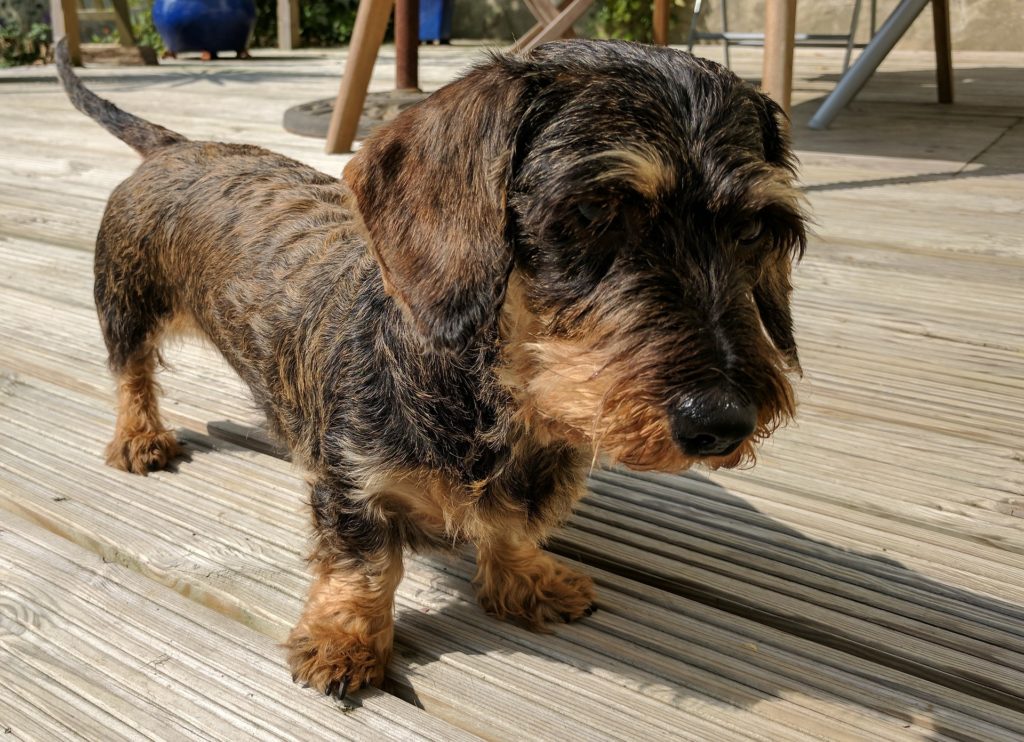As a pet owner it can be quite alarming when your dog doesn’t seem to be his healthiest self. An inability to gain weight, or extreme and sudden weight loss in dogs, may make your furry friend look sickly and have marked effects on his behavior. In these cases, you’re right to be concerned.
If you notice such symptoms, it would be wise to take your dog to the vet for a proper diagnosis since inability to gain weight could be caused by a variety of larger problems.
Symptoms of Underweight Dogs
A major symptom of an underweight dog is abrupt weight loss or a lower than average body size for their breed. But symptoms can go beyond pounds, other revealing signs that your dog may be underweight include:

- Loss of appetite
- Gastrointestinal distress, such as vomiting, diarrhea, or difficulty swallowing
- Lack of energy and lethargy
- Matted or dull coat
- Loss of muscle mass
- Visible rib cage, in extreme cases
Oftentimes, weight loss is difficult to detect as it happens gradually rather than a dramatic shift overnight. If you suspect that your pet may be underweight, you can utilize some at-home methods to visualize your suspicions. First, try standing above you dog and looking down. Your dog should have some waist definition, but an exaggerated hourglass figure could be a sign he is underweight.
This second test can help detect obesity in your pet as well. Gently run your hands along your pets sides and over the rib cage. In a healthy dog, you should feel the ribs below a thin layer of fat. In overweight pets, you won’t be able to feel the ribs while underweight dogs have the reverse problem. If you feel like you are only touching skin and bone, your dog is likely underweight and should be taken to the vet.
Possible Causes of Underweight Dogs
So what can cause your dog to lose weight and not be able to gain it back? There are a number of reasons this could happen. Some of the most common include:
- Poor Nutrition: If your dog’s food does not offer enough nutrients, he may lose weight and be unable to gain it back. Much like humans, dogs need a variety of nutrients to maintain a healthy weight.
- Underfeeding: It’s possible that you are unintentionally underfeeding your dog. The recommended feeding portion listed on a bag of food is the average that a dog will need of that food. Some dogs may require more, some less.
- Bad Teeth: Your dog may have poor dental health or may be suffering from canine periodontal disease, which makes it difficult for them to eat.
- Parasites: There are a variety of parasites, or worms, that your dog could be infected with. Weight loss is a key sign of a parasite infection along with scooting, vomiting, diarrhea, and a distended abdomen.
- Disease: Your dog could be sick with a variety of diseases that are causing the weight loss. Your vet will be able to run lab work to rule out some of these possibilities.
- Diabetes: Dogs are most commonly diagnosed with Type 1 Diabetes, or a lack of insulin production. Other symptoms of diabetes in dogs include excessive thirst, increased urination, dehydration, and urinary tract infections. Some breeds may run a greater risk for developing diabetes, including Australian Terriers, Miniature Schnauzers, Dachshunds, Poodles, Keeshonds, and Samoyeds.
While some of these problems may be diagnosed and treated at home, others will require the assistance of a veterinarian to properly care for your dog. For suspected cases of a parasite, disease, or diabetes, do not attempt at home care. It is always best to be overly cautious and seek professional help, but especially so for those causes.
At Home Treatment for Underweight Dogs

If you suspect your pet is not gaining weight as a result of poor nutrition, underfeeding, or bad teeth you may try increasing your pet’s food. However, you’ll want to take care not to overfeed him. When increasing food, do so incrementally and slowly. You may also consider leaving food out and available to your pet so he can eat as needed. For those pets with bad teeth, utilize soft or wet food.
If you suspect poor nutrition specifically, you will want to change the food you are providing your pet to ensure better nutrition. Understanding ingredients when purchasing high-quality or premium dog food will help inform your decision regarding which product to choose. Some owners may also elect to feed their dog fresh, whole foods like chicken or steak, scrambled eggs, brown rice, and some vegetables. If choosing to drastically change your pet’s diet, consult a veterinarian first.
Sources:
- Lewis, Betty. “Parasites That Won’t Allow Dogs to Gain Weight.” Dog Care – Daily Puppy, Accessed 30 Sep. 2017. 21 Nov. 2017, www.dogcare.dailypuppy.com/parasites-wont-allow-dogs-gain-weight-6074.html.
- Elliott, Pippa. “How to Get Dogs to Gain a Healthy Weight.” WikiHow, 6 June 2018, Accessed 30 Sep. 2017. www.wikihow.com/Get-Dogs-to-Gain-a-Healthy-Weight.
- Barrington, Katherine. “How Do I Help My Skinny Dog Gain Weight?” The Nest, 14 July 2016, Accessed 30 Sep. 2017. www.pets.thenest.com/skinny-dog-gain-weight-3584.html.
- Sherbo, Kat. “Food to Help Your Cat or Dog Gain Weight.” PetCareRx, Accessed 30 Sep. 2017. www.petcarerx.com/article/food-to-help-your-cat-or-dog-gain-weight/768.
- “How To Help Your Rescue Dog Gain Weight.” IHeartDogs.com, 3 May 2018, Accessed 30 Sep. 2017. www.iheartdogs.com/how-to-help-your-rescue-dog-gain-weight/.




